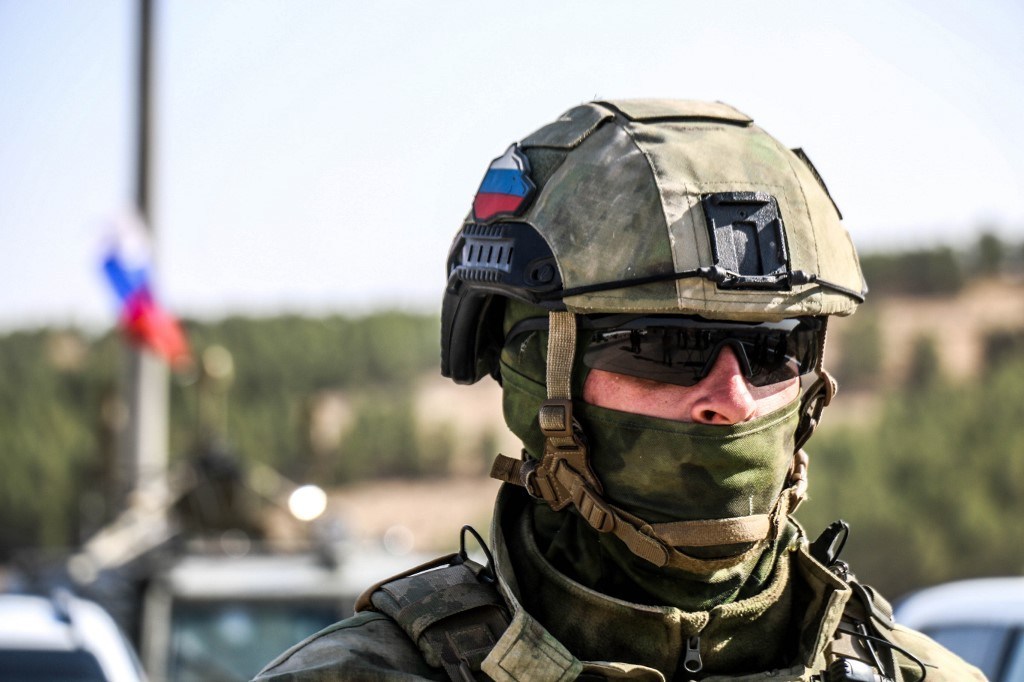[ad_1]
In the spring of 2017, a Syrian man was killed outside the city of Homs. Those who killed him made a gruesome video in which they first brutally beat him, before beheading him and setting fire to his corpse. The men, speaking Russian and wearing camouflage clothing without military insignia, then pose with the body.
Now, the family of the man, Muhammad Taha al-Abdullah, also known as Hamdi Bouta, along with non-governmental organizations in France, Russia and Syria, have filed a legal case in Moscow against the private military contractor, the Wagner Group, that they accuse of sending the mercenaries to Syria.
The case is the first legal attempt to force into the spotlight a shadowy group that has appeared in Syria, Libya and as far afield as the Central African Republic – and that is thought to take orders from the Kremlin. Yet the case is not only about this one killing. It is instead about dismantling the cloak of secrecy and lack of accountability within which the Wagner Group operates.
The group first appeared in 2014, during Russia’s annexation of Ukraine’s Crimean Peninsula. Nicknamed “little green men†by Ukrainians, they were masked, armed men without any identifying uniforms or insignia, who spoke Russian and carried Russian weapons.
The following year, Russia intervened in Syria and, once again, armed men speaking Russian in unmarked uniforms appeared on the battlefield.
Since then, mercenaries from the Wagner Group have reportedly been active in Libya, the Central African Republic and Venezuela – all places where Moscow has political interests, and always on the side Moscow supports.
The Wagner Group’s activities in Syria demonstrate the value of private military contractors to the Kremlin – although the Kremlin currently denies any link with the Wagner Group and such mercenaries remain illegal under Russian law.
One particular incident shows the value to Russia. In February 2018, a battle took place between Syrian government-backed fighters and the US-backed Syrian Democratic Forces in eastern Syria. Clashes and US air strikes killed around 100 fighters, including, the Russian Foreign Ministry later admitted, several dozen Russian citizens.
But crucially, as these were private citizens – who had somehow found themselves in an active war zone – Moscow did not need to acknowledge them, nor admit it was directing them, nor retaliate against the United States for killing them, nor face criticism nor questions at home about foreign policy and why young Russians were being sent to a war zone.
They could simply claim the citizens arrived there of their own free will, and leave insurance companies to deliver the bodies to families and pay insurance money.
The Wagner Group therefore functions for Moscow as the plausibly deniable tip of the spear, allowing it to deny involvement abroad and play down any casualties at home. But for the outside world, that makes it harder to trace any actions directly to Moscow.
If it were regular soldiers involved in the torture and killing of a Syrian man, there would at least be a recognized chain of command. But for private contractors, who are civilians, the law is murkier and means perpetrators can get away with crimes committed abroad.
That is especially so for foreign civilians who commit crimes in countries such as Syria and Libya, where the state is only in control of parts of the country.
That goes to the second part of accountability. It’s not merely the families of the dead in Syria who need answers; the families of the mercenaries need them too. In many cases, they are simply told their sons have died in Syria, without any explanation as to how they got there.
The NGOs are also concerned that such men may return to Russia and pose a threat; as Memorial, the Russian NGO bringing the case, said, “In the end, they come back to Russia and walk on the streets among us.â€
Such impunity breeds other violations of the law. The man thought to be behind the group is a Russian oligarch named Yevgeny Prigozhin, who has close links to President Vladimir Putin. Prigozhin is suspected by the US of having run troll farms that Washington believes interfered in the 2016 election.
Three weeks ago, the Federal Bureau of Investigation quietly added Prigozhin to its most-wanted list for “conspiracy to defraud the United States,†offering a reward of $250,000.
Precisely because the Wagner Group and the troll factory are private companies, Putin can disavow them. Asked directly in 2018 about Prigozhin and mercenaries in Syria, the Russian president claimed he had no knowledge of his activities.
“He’s a businessman,†Putin said. “We do not support him in any way. We do not interfere with him. We do not assist him. It’s his own personal initiative.â€
Such shadow activities have allowed the Kremlin to wage asymmetric warfare, gaining political advantage without the costs of openly declaring involvement.
Those behind the court case hope they can finally get some answers about these mercenaries – and force Moscow to recognize the Russian citizens who are fighting its dirty wars around the world.
This article was provided by Syndication Bureau, which holds copyright.
Faisal Al Yafai is currently writing a book on the Middle East and is a frequent commentator on international TV news networks. He has worked for news outlets such as The Guardian and the BBC, and reported on the Middle East, Eastern Europe, Asia and Africa.
[ad_2]
Source link














